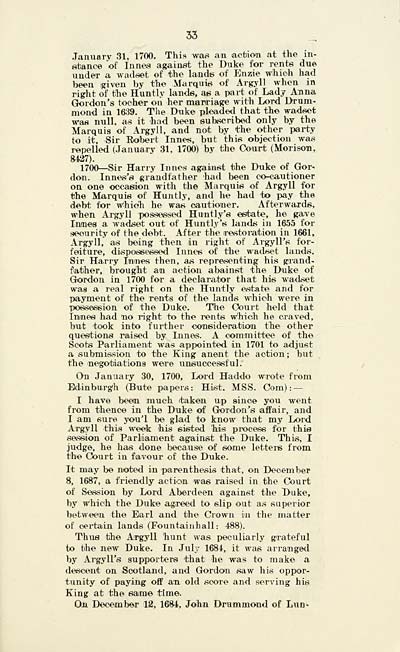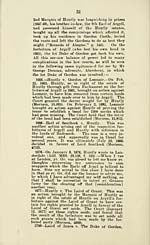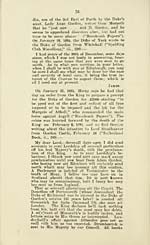1st Duke of Gordon
(37) Page 33
Download files
Complete book:
Individual page:
Thumbnail gallery: Grid view | List view

33
January 31, 1700. This was an action at the in-
stance of Innes against the Duke for rents due
under a wadset of the lands of Enzie which had
been igiven by the Marquis of Argyll when in
right of the Huntly lands, as a part of Lady Anna
Gordon's tocher on her marriage with Lord Drum-
mond in 1639. The Duke pleaded that the wadset
was null, as it had been subscribed only by the
Marquis of Argyll, and not by the other party
to it. Sir Robert Innes, but this objection was
repelled (January 31, 1700) by the Court (Morison,
8427).
1700 — Sir Harry Innes against the Duke of Gor-
don. Innes's grandfather had been co-cautioner
on one occasion with the Marquis of Argyll for
the Marquis of Huntly, and he had to pay the
debt for whion he was cautioner. Afterwards,
when Argyll possessed Huntly'e estate, he gave
Innes a wadset out of Huntly's lands in 1655 for
security of the debt. After the [restoration in 1661,
Argyll, as being then in right of Argyll's for-
feiture, dispossessed Innes of the wadset lands.
Sir Harry Innes then, as representing his grand-
father, brought an action abainst the Duke of
Gordon in 1700 for a declarator that his wadset
was a real right on the Huntly estate and for
payment of the rents of the lands which were in
possession of the Duke. The Court held that
Innes had no right to the rents which he craved,
but took into further consideration the other
questions raised by Innes. A committee of the
Scots Parliament was appointed in 1701 to adjust
a submission to the King anent the action ; but
the negotiations were unsuccessful.
On January 30, 1700, Lord Haddo wrote from
Edinburgh (Bute papers: Hist. MSS. Com): —
I have been much taken np since you went
from thence in the Duke of Gordon's affair, and
I am sure you'l be glad to know that my Lord
Argyll this week his sisted 'his process for this
session of Parliament against the Duke. This, I
judge, he has done because of some letters from
the Court in favour of the Duke.
It may be noted in parenthesis that, on December
8, 1687, a friendly action was raised in the Court
of Session by Lord Aberdeen against the Duke,
by which the Duke agreed to slip out as superior
between the Earl and the Crown in the matter
of certain lands (Fountainhall : 488).
Thus the Argyll hunt was peculiarly grateful
to the new Duke. In July 1684, it was arranged
by Argyll's supporters that he was to make a
descent on Scotland, and Gordon saw his oppor-
tunity of paying off an old score and serving his
King at the same time.
On December 12, 1684, John Drummond of Lun-
January 31, 1700. This was an action at the in-
stance of Innes against the Duke for rents due
under a wadset of the lands of Enzie which had
been igiven by the Marquis of Argyll when in
right of the Huntly lands, as a part of Lady Anna
Gordon's tocher on her marriage with Lord Drum-
mond in 1639. The Duke pleaded that the wadset
was null, as it had been subscribed only by the
Marquis of Argyll, and not by the other party
to it. Sir Robert Innes, but this objection was
repelled (January 31, 1700) by the Court (Morison,
8427).
1700 — Sir Harry Innes against the Duke of Gor-
don. Innes's grandfather had been co-cautioner
on one occasion with the Marquis of Argyll for
the Marquis of Huntly, and he had to pay the
debt for whion he was cautioner. Afterwards,
when Argyll possessed Huntly'e estate, he gave
Innes a wadset out of Huntly's lands in 1655 for
security of the debt. After the [restoration in 1661,
Argyll, as being then in right of Argyll's for-
feiture, dispossessed Innes of the wadset lands.
Sir Harry Innes then, as representing his grand-
father, brought an action abainst the Duke of
Gordon in 1700 for a declarator that his wadset
was a real right on the Huntly estate and for
payment of the rents of the lands which were in
possession of the Duke. The Court held that
Innes had no right to the rents which he craved,
but took into further consideration the other
questions raised by Innes. A committee of the
Scots Parliament was appointed in 1701 to adjust
a submission to the King anent the action ; but
the negotiations were unsuccessful.
On January 30, 1700, Lord Haddo wrote from
Edinburgh (Bute papers: Hist. MSS. Com): —
I have been much taken np since you went
from thence in the Duke of Gordon's affair, and
I am sure you'l be glad to know that my Lord
Argyll this week his sisted 'his process for this
session of Parliament against the Duke. This, I
judge, he has done because of some letters from
the Court in favour of the Duke.
It may be noted in parenthesis that, on December
8, 1687, a friendly action was raised in the Court
of Session by Lord Aberdeen against the Duke,
by which the Duke agreed to slip out as superior
between the Earl and the Crown in the matter
of certain lands (Fountainhall : 488).
Thus the Argyll hunt was peculiarly grateful
to the new Duke. In July 1684, it was arranged
by Argyll's supporters that he was to make a
descent on Scotland, and Gordon saw his oppor-
tunity of paying off an old score and serving his
King at the same time.
On December 12, 1684, John Drummond of Lun-
Set display mode to:
![]() Universal Viewer |
Universal Viewer | ![]() Mirador |
Large image | Transcription
Mirador |
Large image | Transcription
Images and transcriptions on this page, including medium image downloads, may be used under the Creative Commons Attribution 4.0 International Licence unless otherwise stated. ![]()
| Histories of Scottish families > 1st Duke of Gordon > (37) Page 33 |
|---|
| Permanent URL | https://digital.nls.uk/91797620 |
|---|
| Description | A selection of almost 400 printed items relating to the history of Scottish families, mostly dating from the 19th and early 20th centuries. Includes memoirs, genealogies and clan histories, with a few produced by emigrant families. The earliest family history goes back to AD 916. |
|---|

